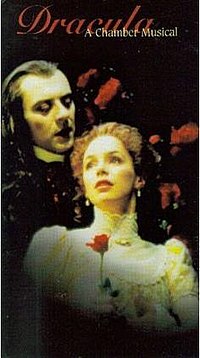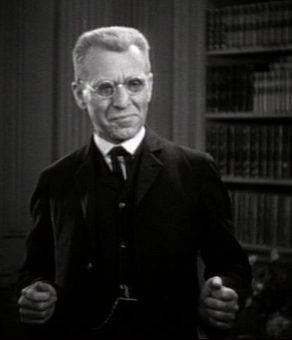
Professor Abraham Van Helsing is a fictional character from the 1897 gothic horror novel Dracula written by Bram Stoker. Van Helsing is a Dutch polymath doctor with a wide range of interests and accomplishments, partly attested by the string of letters that follows his name: "MD, D.Ph., D.Litt., etc.", indicating a wealth of experience, education and expertise. He is a doctor, professor, lawyer, philosopher, scientist, and metaphysic. The character is best known through many adaptations of the story as a vampire slayer, monster hunter and the arch-nemesis of Count Dracula, and the prototypical and the archetypical parapsychologist in subsequent works of paranormal fiction. Some later works tell new stories about Van Helsing, while others, such as Dracula (2020) and I Woke Up A Vampire (2023) have characters that are his descendants.

R. M. Renfield is a fictional character who appears in Bram Stoker's 1897 Gothic horror novel Dracula. He is Count Dracula's deranged, fanatically devoted servant and familiar, helping him in his plan to turn Mina Harker into a vampire in return for a continuous supply of insects to consume and the promise of immortality. Throughout the novel, he resides in an asylum, where he is treated by Dr. John Seward.
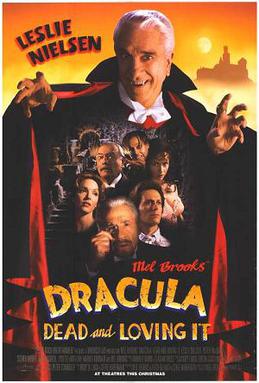
Dracula: Dead and Loving It is a 1995 comedy horror film directed by Mel Brooks and starring Leslie Nielsen. It is a spoof of Bram Stoker's novel Dracula and of some of the story's well-known adaptations.
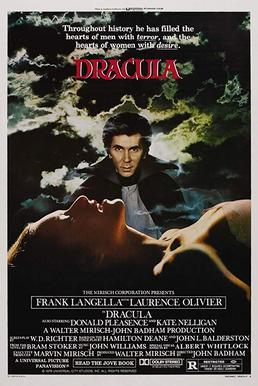
Dracula is a 1979 gothic horror film directed by John Badham. The film starred Frank Langella in the title role as well as Laurence Olivier, Donald Pleasence and Kate Nelligan.

Wilhelmina "Mina" Harker is a fictional character and the main female character in Bram Stoker's 1897 Gothic horror novel Dracula.

Quincey P. Morris is a fictional character in Bram Stoker's 1897 gothic novel Dracula.

Lucy Westenra is a fictional character in the 1897 novel Dracula by Bram Stoker. The 19-year-old daughter of a wealthy family, she is Mina Murray's best friend. Early in the story, Lucy gets proposed to be three suitors, Arthur Holmwood, John Seward, and Quincey Morris, on the same day. Turning the latter two down due to already being in love with Arthur, she accepts his proposal. Before getting the chance to marry, Lucy becomes Count Dracula's first English victim, and despite Seward contacting Abraham Van Helsing for help, she transforms into a vampire. Following her return as a vampire and attacks on children—dubbed the "Bloofer Lady" by them—she is eventually cornered into her crypt by Van Helsing and her suitors who destroy her, putting her soul to rest.

Dracula, the Musical is a musical based on the original 1897 Victorian novel by Bram Stoker. The score is by Frank Wildhorn, with lyrics and book by Don Black and Christopher Hampton.

Jonathan Harker is a fictional character and one of the main protagonists of Bram Stoker's 1897 Gothic horror novel Dracula. An English solicitor, his journey to Transylvania and encounter with the vampire Count Dracula and his Brides at Castle Dracula constitutes the dramatic opening scenes in the novel and most of the film adaptations.
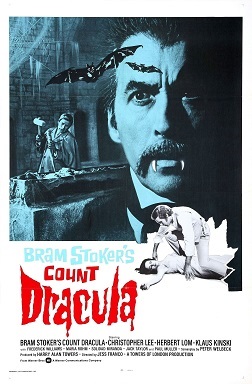
Count Dracula is a 1970 gothic horror film directed by Jesús Franco, based on the novel Dracula by Bram Stoker. It stars Christopher Lee, Herbert Lom and Klaus Kinski.

John "Jack" Seward, M.D. is a fictional character appearing in Bram Stoker's 1897 novel Dracula.
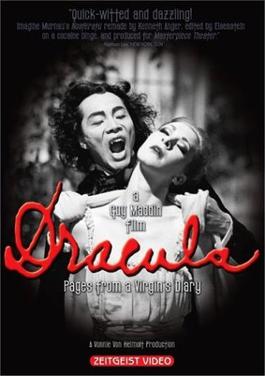
Dracula: Pages from a Virgin's Diary is a 2002 horror film directed by Guy Maddin, budgeted at $1.7 million and produced for the Canadian Broadcasting Corporation (CBC) as a dance film documenting a performance by the Royal Winnipeg Ballet adapting Bram Stoker's novel Dracula. Maddin elected to shoot the dance film in a fashion uncommon for such films, through close-ups and using jump cuts. Maddin also stayed close to the source material of Stoker's novel, emphasizing the xenophobia in the reactions of the main characters to Dracula.
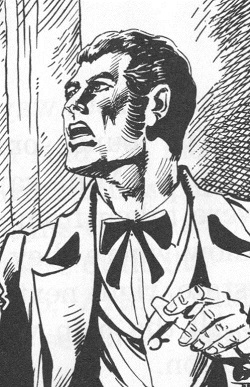
Arthur "Art" Holmwood is a fictional character in Bram Stoker's 1897 novel Dracula.
"Dracula" is a video-taped television play adaptation of Bram Stoker's 1897 novel Dracula, part of the series Mystery and Imagination. Denholm Elliott played Count Dracula with Susan George as Lucy Weston.

Count Dracula is a British television adaptation of the 1897 novel Dracula by Bram Stoker. Produced by the BBC, it first aired on BBC 2 on 22 December 1977. It is among the more faithful of the many adaptations of the original book. Directed by Philip Saville from a screenplay by Gerald Savory, it stars Louis Jourdan as Count Dracula and Frank Finlay as Professor Van Helsing.
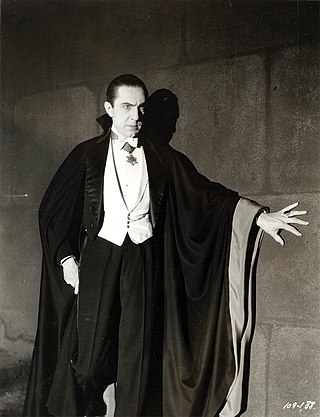
Count Dracula is the title character of Bram Stoker's 1897 gothic horror novel Dracula. He is considered the prototypical and archetypal vampire in subsequent works of fiction. Aspects of the character are believed by some to have been inspired by the 15th-century Wallachian prince Vlad the Impaler, who was also known as Vlad Dracula, and by Sir Henry Irving, an actor for whom Stoker was a personal assistant.
Dracula is a television adaptation of Bram Stoker's 1897 novel, Dracula, produced by Granada Television for WGBH Boston and BBC Wales in 2006. It was written by Stewart Harcourt and directed by Bill Eagles.

Dracula is a stage play written by the Irish actor and playwright Hamilton Deane in 1924, then revised by the American writer John L. Balderston in 1927. It was the first authorized adaptation of Bram Stoker's 1897 novel Dracula. After touring in England, the original version of the play appeared at London's Little Theatre in July 1927, where it was seen by the American producer Horace Liveright. Liveright asked Balderston to revise the play for a Broadway production that opened at the Fulton Theatre in October 1927. This production starred Bela Lugosi in his first major English-speaking role.
Dracula is an adaptation, first published in 1996, by American playwright Steven Dietz of Bram Stoker's 1897 novel by the same name. Though it has never run on Broadway, the author lists it among his most financially successful works, and it is frequently performed near Halloween in regional and community theaters. Closely following the plot of the novel, the play chronicles Count Dracula's journey to England, his stalking of two young women, and his pursuit and eventual defeat by the heroines' suitors and their associates.
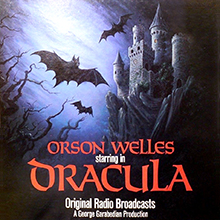
"Dracula" is an episode of the American radio drama anthology series The Mercury Theatre on the Air. It was performed as the premiere episode of the series on Monday, July 11, 1938, and aired over the Columbia Broadcasting System radio network. Directed and narrated by actor and future filmmaker Orson Welles, the episode was an adaptation of Bram Stoker's 1897 novel Dracula.
